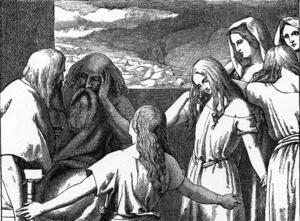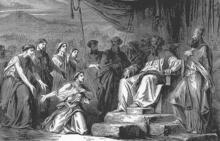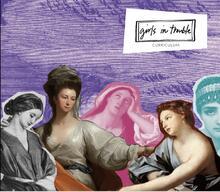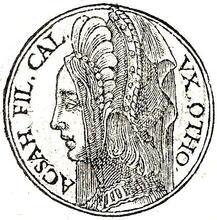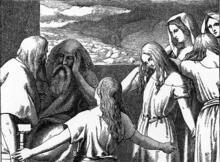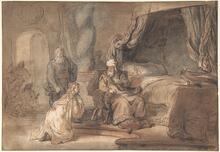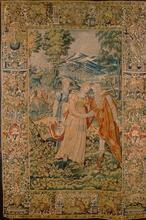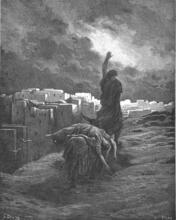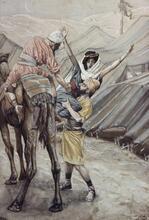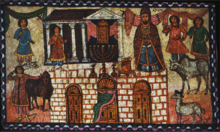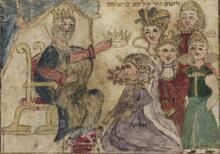Daughters of Zelophehad: Midrash and Aggadah
Drawing of Zelophehad's daughters, five biblical women who demanded the right to inherit land. From the Metropolitan Museum of Art via Wikimedia Commons.
The Rabbis’ interpretations of the five daughters of Zelophehad are exceedingly positive. Many of their stories concern the process by which they inherited large portions of land, and they are described as able to offer scriptural interpretations. The Babylonian Talmud writes that they chose whom they married and were permitted to intermarry between tribes. The midrash says that they are mentioned by the Patriarchs and are so righteous that they are blessed with children despite their old age.
The Rabbis rain many praises on the daughters of Zelophehad: they are wise, exegetes, and virtuous (BT Bava Batra 119b); they are like the daughters of kings, fine and worthy (Sifrei Zuta 15:32). The A type of non-halakhic literary activitiy of the Rabbis for interpreting non-legal material according to special principles of interpretation (hermeneutical rules).midrash declares that all five daughters possessed all these admirable qualities: none was better than the others, and all were equal (Sifrei on Numbers, para. 133).
The women of the wilderness generation repaired the breaches committed by the men. Thus, when the men asked their wives for their gold earrings to make the Golden Calf, the women refused, because they would have nothing to do with this sacrilege. Similarly, with regard to the sin of the spies sent to scout out The Land of IsraelErez Israel: the men slandered the land, while the women kept their peace.
In contrast with the men who did not want to enter the land and gain possession of it, the daughters of Zelophehad arose to demand a portion in the land (Num. Rabbah 21:10), as the midrash learns from the juxtaposition of the episode of the daughters of Zelophehad with the description of the death of the wilderness generation for the sin of the spies in the preceding verse (Num. 26:65).
Tractate Semahot states the general principle that “good things are effected through the agency of the meritorious.” It notes that the section of the land-inheritances, that was worthy of being stated, was indeed so set forth, in connection with the daughters of Zelophehad (Semahot 8:14). “When the daughters of Zelophehad heard that Erez Israel was to be apportioned to the tribes in accordance with the men and not by women, they gathered together to take counsel. One said to the other: The Omnipresent’s compassion is not like that of flesh and blood. Flesh-and-blood creatures have greater compassion for males than for females. But the One who spoke and the world came into being is not like that. Rather, His mercy extends to all, to the males and to the females, as it is said [Ps. 145:9]: ‘The Lord is good to all, and his mercy is upon all His works’” (Sifrei [ed. Buber], 133).
Genealogy
The daughters of Zelophehad came to the study hall where Moses, Eleazar the priest, the nesi’im (chieftains) and the whole assembly were in attendance, and they stood before them all (BT Bava Batra 119b). Num. 27:1 presents a lengthy lineage of the daughters of Zelophehad who approach Moses: “The daughters of Zelophehad, of Manassite family—son of Hepher son of Gilead son of Machir son of Manasseh son of Joseph—came forward.” According to the midrash, this detailed genealogy teaches that not only were these women great in their own right; their father, Machir, and Joseph, from whom they were descended, all bask in their reflected light.
The daughters relate in Num. 27:3 that their father died “for his own sin”; some Rabbis identify Zelophehad with the man (Num. 15:32–36) who gathered wood on the Sabbath (BT Shabbat 96b). Others, however, argue that their father was righteous and blameless, which is learned from the daughters, to whom Scripture ascribes a positive lineage, which extends back to Joseph (Sifrei on Numbers, para. 133).
Stories of their Intellectual Prowess
The wisdom of the daughters lies in their speaking at the appropriate time. Moses was sitting and expounding the laws of yibum (Marriage between a widow whose husband died childless (the yevamah) and the brother of the deceased (the yavam or levir).Levirate marriage (yibbum)) set forth in Deut. 25:5: “When brothers dwell together and one of them dies and leaves no son […]. Her husband’s brother shall unite with her: take her as his wife.” The daughters of Zelophehad said to Moses: “If we are as important as a son, give us a portion as a son; and if not, let our mother be subject to levirate marriage.”
They were also capable of expounding Scripture, for they said to Moses: “If our father had had a son, we would not have spoken” (BT Bava Batra 119b). They saw something that Moses had not, for the Holy One, blessed be He, said: “The daughters of Zelophehad speak right” [Num. 27:7]—whatever they demand, they demand rightly, for so it is written before Me in Heaven (Sifrei on Numbers, para. 134; Sifrei Zuta 27). God told Moses: “Give them a hereditary holding” [Num. 27:7]: give them lands, give them movable property, give them their father’s portion together with the portion of their father’s brother (once again using as a proof text): “The daughters of Zelophehad speak right” (JT Bava Batra 8:2, 16a). About this the midrash exclaims “Happy is the one whose words are confirmed by the Holy One, blessed be He” (Mekhilta de-Rabbi Ishmael, Masekhta de-Ba-Hodesh, Yitro 9).
Stories of Land Ownership
Some traditions maintain that the daughters of Zelophehad took three portions of the land holding: the portion of their father, who was among those who left Egypt; and two portions of their grandfather Hepher (who, as a firstborn, had received a double portion—M Bava Batra 8:3). Another tradition maintains that they took four portions, since Zelophehad had an additional brother who had no sons. According to this tradition Moses knew that they would inherit, but he did not know whether they were entitled to take the firstborn’s share (BT Bava Batra 119a).
Moses ordered the daughters of Zelophehad to take husbands from the tribe of Manasseh; the midrash relates that even the youngest of the sisters did not marry before the age of forty, because they waited to marry the husbands who were fit for them, from their own tribe. Usually, if a woman has not given birth by this age, she is no longer capable of bearing children, but, due to their righteousness, a miracle was performed for the daughters of Zelophehad, and they were blessed with children (BT Bava Batra 119b).
The The discussions and elaborations by the amora'im of Babylon on the Mishnah between early 3rd and late 5th c. C.E.; it is the foundation of Jewish Law and has halakhic supremacy over the Jerusalem Talmud.Babylonian Talmud presents a different version. Although the law requires daughters who inherit a land holding to marry within their own tribe, these women were permitted to intermarry with men from any of the tribes. This is derived from Num. 36:6: “They may be married to whom they think best.” The restriction placed upon them, of marrying only with men from the clan of their father’s tribe, was only advice, that they should marry husbands suitable for them, but they were permitted to marry anyone they wished (BT Bava Batra 120a). From the time at which all the generation of those who entered the land were extinct, every daughter was free to marry a man from another tribe (ibid., 121:71).
The midrash says that because of their importance the daughters of Zelophehad were already mentioned by the Patriarchs. Jacob’s blessing to Joseph (Gen. 49:22) contains an allusion to them: the last phrase of this verse, which is variously translated as “Joseph is a fruitful vine, a fruitful vine by a fountain; its branches run over the wall” is understood differently by the midrash: bnot is rendered literally, as the “daughters [of Zelophehad]” and shur represents the Jordan River; the daughters of Zelophehad took a portion of the tribe of Manasseh, on both sides of the Jordan.
The daughters are presumably also mentioned by Joseph when he brings his son Manasseh to Jacob to be blessed, telling his father (Gen. 48:18): “for this is the firstborn [ha-bekhor].” The definite article ha- in the word ha-bekhor, with the numerical value of five, alludes to the five daughters of Zelophehad. According to this midrash, Joseph insisted upon his son Manasseh’s right to receive his blessing from his grandfather’s right hand, by merit of the five women who would be born to this tribe (Num. Rabbah 14:6; 21:12).
Biala, Tamar, editor. Dirshuni: Israel Women Writing Midrash (Hebrew). First and Second Editions.
Shemesh, Yael. "A gender perspective on the daughters of Zelophehad: Bible, Talmudic Midrash, and modern feminist Midrash." Biblical interpretation 15, no. 1 (2007): 80-109.

